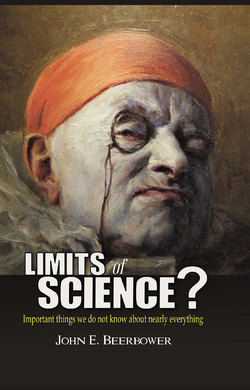Читать книгу Limits of Science? - John E. Beerbower - Страница 13
На сайте Литреса книга снята с продажи.
Inferences and predictions
ОглавлениеPhilosophers have struggled with the question of why such an assumption is philosophically justifiable (as opposed to practically or pragmatically justifiable: e.g., the fact that the assumption has worked in the past has proven to be a good practical reason to assume that it will work again). The question is underscored, or perhaps generated, by the comparison of induction with deductive reasoning, in which the conclusions are compelled as a matter of logical necessity given the premises and rules of deduction. The simple philosophical argument is that if induction could be reformulated so that you could deduce the conclusions being drawn, then it would no longer have the characteristics of induction (i.e., it would have become deduction), but if the demonstration of validity of inductive reasoning is through some other level of inductive reasoning, then the proof is necessarily circular—you cannot prove that induction is valid by means of induction.
I have two concerns about this argument. First, it is constructed on the assumption that there are two and only two types of inference: deductive and inductive. If that assumption is correct, then the dilemma inevitably arises—if you can justify induction by deduction, then it is no longer induction; if you can only justify it by induction, then your proof is necessarily circular. So, one must necessarily look beyond deduction and induction to find a principle of induction.
Interestingly, the same point can be made about deduction. If deduction can be justified only by deductive inference, then deduction is also circular. Of course, as previously discussed, we already recognized that deduction essentially is circular, that is, valid by definition.
That segue brings us to my second concern. The “problem” arises because of the application of the standards of deduction, that is, logical necessity—the way in which a conclusion is “guaranteed” or mandated in a deductive system. Induction cannot and should not be judged by the standards of deduction. In fact, it is interesting to ask what it means that some conclusion is “guaranteed” in the sense of this argument. As we discussed above, there are serious limitations in how deductive reasoning relates to real world events. The reason that deduction is so compelling is that the conclusions are necessarily incorporated in the premises. As a result, deductive reasoning cannot lead to conclusions that contain anything “new.” Now such reasoning may (and often does) lead to conclusions that had not previously been noticed or “seen.” They may not have been obvious, but they are not “new.” (This subject is discussed further in the next chapter on Mathematics.) Deduction, unlike induction, is not ampliative—it does not and cannot lead to something new and additional.
Indeed, the power of induction is that it necessarily leads to conclusions or predictions that extend beyond the known or existing premises and observations. That is why induction is not, and inevitably cannot be, as logically “certain” as deduction. That is also why induction is far more interesting and relevant to our day-to-day lives. If one rejects the idea that the external world is made up of elements that have direct correspondence to innate mental images with real world relationships accurately reflected by human mental processes, so that man can know the world through a priori reasoning; then for any understanding of the external world, there must be some means of access by the mind to the external phenomena. Such access is presumably gained through the senses. One can speculate that the initial tool that the mind uses to gain understanding from the sensory perceptions is induction, based upon the identification of apparent patterns.
It also seems that mankind made an important leap when man began to formulate models and theories that provided explanations for the predictions that were suggested by induction. One could conceive of induction as generating “rules of thumb” for selecting likely appropriate responses to external stimuli, and which rules often assisted in the preservation of the individuals and the species. When theory building began, induction may have been an important source of conjectures, as well as a means of identifying problems, which new deductive theories could be propounded to solve.
